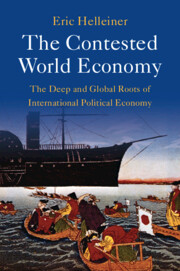Book contents
- The Contested World Economy
- The Contested World Economy
- Copyright page
- Dedication
- Contents
- Preface
- Abbreviations
- 1 Introduction and Overview
- Part I The Three Orthodoxies in a Global Context
- Part II Beyond the Three Orthodoxies
- 8 Autarkic Visions of Economic Self-Sufficiency
- 9 Environmentalist Calls for a More Sustainable Economic Order
- 10 Feminist Critiques of a Patriarchal World Economy
- 11 Pan-African Responses to a Racialized World Economy
- 12 Religious and Civilizational Political Economies of Pan-Islamism and Pan-Asianism
- 13 Distinctive Visions of Economic Regionalism for East Asia, Europe, and the Americas
- Part III Ending at a Beginning
- Works Cited
- Index
11 - Pan-African Responses to a Racialized World Economy
from Part II - Beyond the Three Orthodoxies
Published online by Cambridge University Press: 20 April 2023
- The Contested World Economy
- The Contested World Economy
- Copyright page
- Dedication
- Contents
- Preface
- Abbreviations
- 1 Introduction and Overview
- Part I The Three Orthodoxies in a Global Context
- Part II Beyond the Three Orthodoxies
- 8 Autarkic Visions of Economic Self-Sufficiency
- 9 Environmentalist Calls for a More Sustainable Economic Order
- 10 Feminist Critiques of a Patriarchal World Economy
- 11 Pan-African Responses to a Racialized World Economy
- 12 Religious and Civilizational Political Economies of Pan-Islamism and Pan-Asianism
- 13 Distinctive Visions of Economic Regionalism for East Asia, Europe, and the Americas
- Part III Ending at a Beginning
- Works Cited
- Index
Summary
Pan-African thinkers in the pre-1945 period developed innovative ideas that challenged the racialized hierarchies of the world economy. Some of these thinkers are discussed in previous chapters, such as George Padmore and C.L.R. James (both discussed in chapter 7) as well as Amy Ashwood Garvey (chapter 10). This chapter discusses three other prominent Pan-African thinkers who sought to cultivate the transnational economic solidarity of Africans and the African diaspora in order to challenge this group’s subordinate position in the world economy. The Jamaican-born Marcus Garvey was the best-known popularizer of this kind of “economic Pan-Africanism” via his Universal Negro Improvement Association and its Black Star Line. The other two discussed in the chapter are W.E.B. Du Bois (from the United States) and Hubert Harrison (who migrated from the Danish West Indies to the United States). The latter two disagreed with Garvey and each other about a number of issues, ranging from their views of capitalism to the role of the African diaspora in Pan-African politics.
Keywords
- Type
- Chapter
- Information
- The Contested World EconomyThe Deep and Global Roots of International Political Economy, pp. 187 - 201Publisher: Cambridge University PressPrint publication year: 2023

